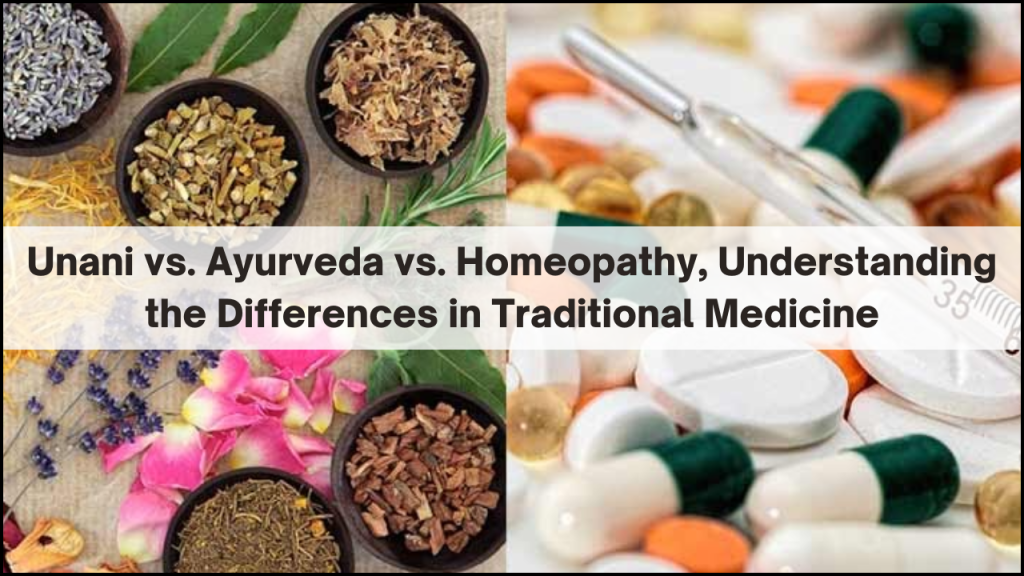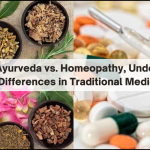
Traditional medicine systems have played a vital role in healthcare for centuries. Among them, Unani, Ayurveda, and Homeopathy are three significant alternative medicinal systems practiced worldwide. While all three focus on natural healing and holistic well-being, they have distinct principles, methods, and treatment approaches. This article provides an in-depth comparison of these three medical systems, highlighting their differences in origin, philosophy, diagnosis, treatment methods, and effectiveness.
Origin and Historical Background
- Unani Medicine: Originated in Greece (Unan) and was systematized by Hippocrates and Galen. It later evolved with significant contributions from Persian and Arab physicians like Avicenna (Ibn Sina).
- Ayurvedic Medicine: Developed in India over 5,000 years ago, rooted in the Vedas (especially the Atharvaveda). The key texts include Charaka Samhita and Sushruta Samhita.
- Homeopathy: Founded in Germany in the late 18th century by Dr. Samuel Hahnemann. It is based on the principle of “like cures like” (Law of Similars).
Fundamental Principles
- Unani Medicine: Based on the four humors theory – blood, phlegm, yellow bile, and black bile. Health is maintained by balancing these humors.
- Ayurveda: Focuses on the balance of three doshas – Vata (air & space), Pitta (fire & water), and Kapha (earth & water). Harmony between these doshas ensures good health.
- Homeopathy: Works on the concept of “Similia Similibus Curentur” (like cures like). A highly diluted substance that produces symptoms in a healthy person can cure similar symptoms in a sick person.
Diagnosis Methods
- Unani: Uses pulse examination (Nabz), urine & stool analysis, and detailed patient history.
- Ayurveda: Diagnosis is done through Nadi Pariksha (pulse reading), tongue examination, and Prakriti (body constitution) analysis.
- Homeopathy: Diagnosis is symptom-based, considering mental, emotional, and physical symptoms along with personality traits.
Treatment Approach
- Unani Medicine: Uses a combination of herbal formulations, dietary recommendations, regimental therapies (hijama, leech therapy, massage), and pharmacotherapy.
- Ayurveda: Focuses on herbs, Panchakarma (detoxification), yoga, diet control, and lifestyle modifications.
- Homeopathy: Uses highly diluted medicinal substances (potentization), prepared from plants, minerals, and animal products.
Effectiveness & Speed of Healing
- Unani Medicine: Effective for chronic ailments like arthritis, digestive issues, and skin diseases. Works gradually but is long-lasting.
- Ayurveda: Takes a holistic approach and works best for metabolic, digestive, and chronic diseases. Results vary based on individual constitution.
- Homeopathy: Shows slow but permanent relief for allergies, autoimmune disorders, and psychological conditions. Works best when started early.
Safety & Side Effects
- Unani Medicine: Generally safe when prescribed correctly, but some herbal-metallic formulations may have side effects if misused.
- Ayurveda: Mostly safe, but self-medication with heavy-metal-based formulations (like Bhasmas) can cause toxicity.
- Homeopathy: Considered the safest, with minimal side effects since medicines are highly diluted.
Comparison Table
| Feature | Unani Medicine | Ayurvedic Medicine | Homeopathic Medicine |
|---|---|---|---|
| Origin | Greece & Persia | India | Germany |
| Key Principle | Balancing four humors | Balancing three doshas | Like cures like |
| Diagnosis | Pulse reading, Urine & stool analysis | Pulse reading, Body constitution analysis | Detailed case-taking (mental, emotional, and physical symptoms) |
| Treatment | Herbal medicines, diet therapy, regimental therapies | Herbal medicines, Panchakarma, yoga | Diluted natural substances (potentization) |
| Effectiveness | Best for chronic diseases, gradual healing | Works on the root cause, long-term effects | Slow but effective for deep-rooted diseases |
| Side Effects | Can have side effects if misused | Mostly safe, but some formulations can be toxic if misused | No known side effects due to high dilution |
| Common Uses | Skin disorders, digestive issues, arthritis | Metabolic diseases, stress-related disorders, digestive issues | Allergies, autoimmune diseases, mental health conditions |
| Safety | Safe under expert supervision | Generally safe | Safest of all |









